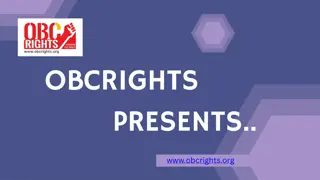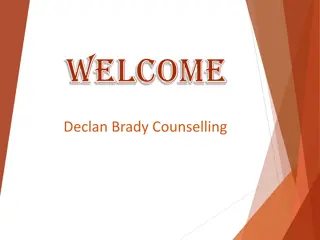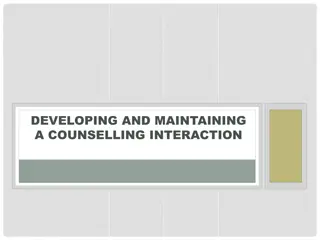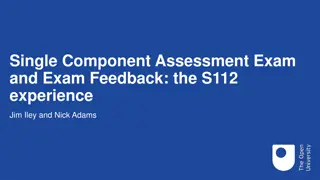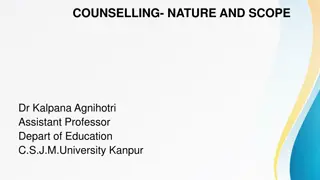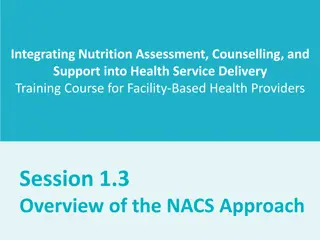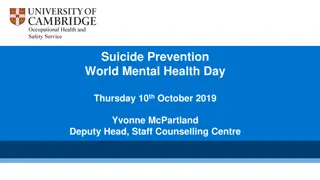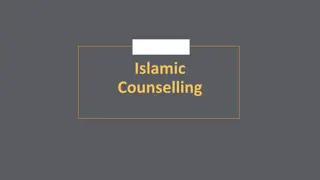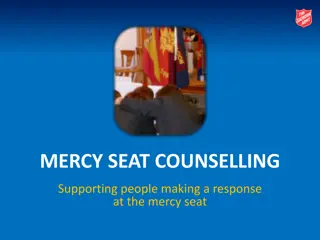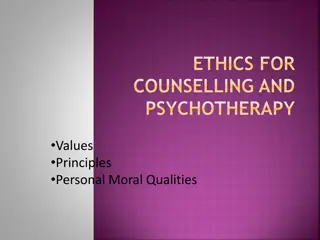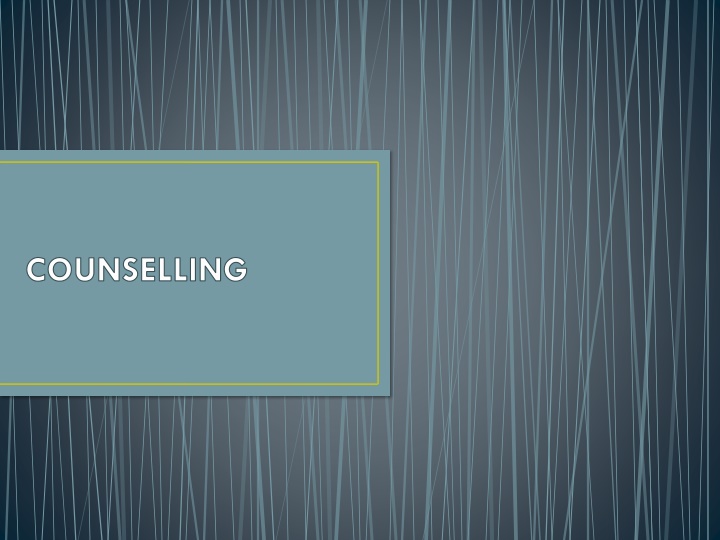
Understanding the Process of Counseling
Counseling is a profession where counselors help clients understand problems, make good decisions, and bring about changes in thoughts, emotions, and behaviors. The process involves setting professional standards, dealing with personal and social concerns, and focusing on clients' goals and potentials.
Download Presentation

Please find below an Image/Link to download the presentation.
The content on the website is provided AS IS for your information and personal use only. It may not be sold, licensed, or shared on other websites without obtaining consent from the author. If you encounter any issues during the download, it is possible that the publisher has removed the file from their server.
You are allowed to download the files provided on this website for personal or commercial use, subject to the condition that they are used lawfully. All files are the property of their respective owners.
The content on the website is provided AS IS for your information and personal use only. It may not be sold, licensed, or shared on other websites without obtaining consent from the author.
E N D
Presentation Transcript
WHAT IS COUNSELLING? Counselling is a process in which the counselor, or therapist, helps the client understand the causes for problems and guides the person through the process of learning to make good life decisions Counseling helps to bring change in life: Change in thought; Change in emotion; and Change in behavior. Both the American Counseling Association (ACA) and Division 17 (Counseling Psychology) of the American Psychological Association (APA) have defined counseling on numerous occasions. Their definitions contain a number of common points, some of which follow
UNDERSTANDING COUNSELLING 1. Counselling is a profession- Counselors are members of organizations that set professional and ethical standards and promote state licensing and certification by national associations (Wittmer & Loesch, 1986). The process of certification and licensing and the adherence to ethical codes assure the public that the counselor meets minimal educational and professional standards. Counselors should possess personal qualities of maturity, empathy, and warmth. Overall, counseling is active and differs considerably from passively listening to problem.
2. Counseling deals with personal, social, vocational, empowerment, and educational concerns. Counselors work only in areas in which they have expertise. These areas may include intra- and interpersonal concerns related to school or college adjustment, psychological health, aging, marriage/ family issues, employment, and rehabilitation. 3. Counseling is conducted with persons who are considered to function within the normal range . Clients have adjustment, development, or situational concerns; and their problems require short-term intervention. They are not considered sick but stuck . Sometimes they just need information, but usually they are looking for a way to clarify and use the information they already posses
4. Counseling is a process in which clients learn how to make decisions and formulate new ways of behaving, feeling, and thinking. Counselors focus on the goals their clients wish to achieve. Clients explore their present levels of functioning and the changes that must be made to achieve personal objectives. 5. Counseling encompasses various subspecialties. Subspecialties include school or college counseling, marriage and family counseling, psychological health counseling, rehabilitation counseling, addiction counseling, and career counseling. Each has specific educational and experimental requirements for the practitioners
GOALS OF COUNSELLING Important goals of counseling are as: Facilitating behavioral change; Enhancing one s coping skill; Promoting decision making; Improving relationships; and Facilitating one s potentials.
DIFFERENCE BETWEEN GUIDANCE AND COUNSELLING
WHO IS A COUNSELLOR?? A counselor is an individual who Understands the feelings of a client and treats it as fact Keeps all information confidential Facilitates discussions on the issues in question Builds self-esteem of the client Reassures if the client is insecure Solicits the client s own feelings and ideas for solutions Be empathetic to the client and show care Has patience Does not get distracted during interaction with client Builds confidence Considers the client s long and medium term goals Avoids acting like an expert Has a BIG ear and SMALL mouth so is able to listen more than speak.
WHO NEEDS COUNSELLING? It is important first step to identify the need for counseling. Whether the person concerned requires counseling at all and if so what is the reason for the same. Sometimes counseling may be needed by a child in the school who is unable to benefit from the teaching learning process that goes on in the school. In yet another case an adolescent facing self esteem problems or showing aggression or extreme anger at trivial things may need counseling to overcome the anger and aggression and restore the self esteem. In certain other cases an adult who has gone through a financial crisis in business may need counseling to overcome the depression that the person is facing. I n yet other cases, there may be a marital problem or divorce situation which needs to be handled through counseling. In orgnaisations and industries, counseling may be required to motivate the employees to work better and to their full potential or in some cases to overcome the workplace violence etc. Counselling for better interpersonal relationship is very much needed in an organisation where the work and performance of employees are affected due to lack of positive interpersonal relationship amongst various levels of staff.
FEW BASICS ABOUT COUNSELLING!! 1. How Does Counseling Work? Counseling is about taking control and making the changes your clients want. Within the safety of the therapeutic relationship your client can express deeply-held feelings such as anger, pain and anxiety that they may not have fully acknowledged before. By making sense of the past and gaining insight into present behavior, more options can be created for change in the future. So confusion can lead to clarity; self-doubt to self-awareness and self-esteem. Counseling therapy can be the path towards living in a more satisfying and fulfilling way. It s about living the life your clients want
2. How Often Should Clients Have Appointments? Appointments would usually be on a weekly basis, but they could be more or less frequent by arrangement. You should be able to offer appointments on a flexible basis, rather than a regular time each week, to accommodate your client s particular needs. 3. How Long Should Counseling Last? Normally sessions last for one hour each for approximately 8 -12 weeks. The number of sessions would depend on individual cases and progress. 4. How Much Could You Charge Per Session? As a counselor, who has an established practice you could expect to earn depend on market forces. You should note that counseling on the National Health Service may be free
5. When Will The Client Start To Feel Better? Some people feel better even after the first session. Others find it takes time to feel the benefit and may not even realize there has been any benefit until they stop going to see the counselor and compare how they were before the counseling started. Everyone is individual and the amount of benefit your client receives from your sessions is very personal. 6. When Is A Counselor Not Ready To Counsel? A counselor should not practice when s/he - creativity Has prejudices against the client about the issues faced by the client themselves and their client Be impulsive to clients comments Lacks motivation and Has preconceptions Feels social distance between Feels insecure and lacks self confidence
COUNSELLING SKILLS Skills such as Active listening Clarification Reflection Effective questioning skills Counsellor needs to be empathetic- seeing things from clients point of view but not sympathetic- feeling sorry for their clients and getting emotionally involved.
SCOPE OF COUNSELLING Any clients facing the following common problems are encouraged to see a counselor - Academic Performance Trouble with Concentrating, Studying, or Attending Classes Anxieties about Aspects of Study including Exams and Presentations Achievement Conflicts Family Issues Anxiety/Persistent Worry/Panic Attacks Parental Separations Stress Life Transitions Loneliness/Isolation/Homesickness Difficulty in making Decisions Uncertainty about the Future Difficulty Adjusting to Life Relationships/Intimacy Issues Friend or Roommate Conflicts Difficulty Making or Keeping Friends Lack of Self Confidence or Low Self-esteem Self-Injury Suicidal Thoughts Worries about Appearance Anger Management Identity Confusion Eating or Sleeping Disorders/ Body Image Concerns Weight Loss or Gain Depression Sexuality Abusive Relationships Alcohol or Drug/Substance Use/ Abuse Sexual Assault/Rape/Abuse Pregnancy
MYTHS ABOUT COUNSELLING 1. Myth: Counseling is only for crazy people or people with problems . Foremost among the myths regarding counseling is that it is only used to treat psychological illness. Counseling aims at facilitating personal and interpersonal growth. As such, people in a variety of circumstances may find the services of a counselor helpful 2. Myth: Counselor srole is to give advice . Another misconception about counseling is that it is a process in which the client tells what the problem is, and the counselor tells the client what to do. A therapist works to help facilitate change, not direct it
3. Myth: Counselor does not know me and cant help me. Actually, this is one of the most important reasons why counseling can be successful. Since a counselor is not a part of your day to day life, they are capable of being more impartial with less bias 4. Myth: Counselors just sit there, nod, and stay silent. Many stereotypes and depictions of counselors in movies have led to their image being touchy-feely , reading your mind, detached, or ineffective. Most counselors today are active and engaged, using questions, reactions, and interventions to help you move towards your goals. 5. Myth: Everyone will know I m seeing a counselor. So what? It is your life and you alone can take charge of your life and own responsibility to whatever happens. Counseling is a confidential experience of the client and happens totally between the client and the counselor
6. Myth: Counseling will change who I am forever. Counseling will not require you to make changes you do not like, that you are not ready for, or that go against your beliefs and values 7. Myth: Counseling is expensive. Yes, it is because of the nature of service and number of sessions. But it is providentially free in some communities 8. Myth: Counselors can give solutions to all problems and can cure giving medicines. Counselors are not medical professionals. They cannot prescribe medicines. At the most if they realize the need they will refer to a psychiatrist or a psychological health professional
9. Myth: Counseling is only for Men/ Women. Counseling is not gender specific. But it is a fact that number of male seeking help is more than the female gender. One of the reasons could be that the female gender has a better emotional control comparatively. 10. Myth: Therapy will make your painful problems worse. Yes, you will go back into the past and yes, it may bring up some bad memories. But don t be afraid. Good therapists guide their clients through painful experiences, but in a way that is safe and not overwhelming
REFERENCES https://www.slideshare.net/praveensureshpai/counseling- process https://abbahailegebriel.co.uk/ProcessCounselling.pdf http://www.dspmuranchi.ac.in/pdf/Blog/stages%20of%20cou nselling.pdf https://www.researchgate.net/publication/325844365_INTRO DUCTION_TO_COUNSELING http://egyankosh.ac.in/bitstream/123456789/23936/1/Unit- 3.pdf https://www.counsellingconnection.com/wp- content/uploads/2013/03/Counselling-and-the-Counselling- Process-1.pdf







